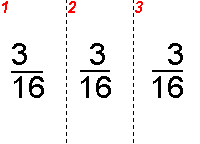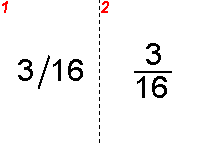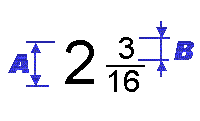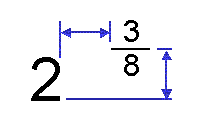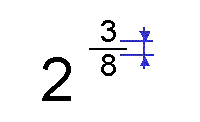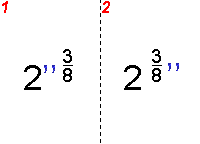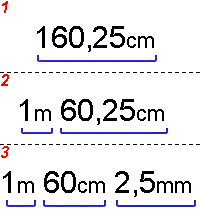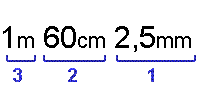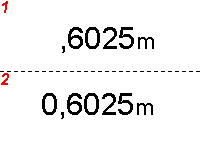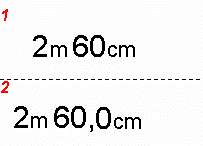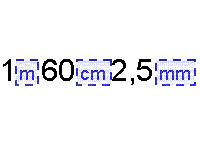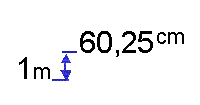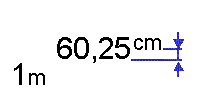Format Definitions
This section deals with dimension value descriptions, which are user-defined formats to be applied to dimension values.
To create a new dimension value display format, you must use the Standard Definition editor (via Tools > Standards). Select the Value Formats type in the standards editor, and then click the Add Instance button to add a new instance of a format. This will create a sample format definition that you will then customize to suit your needs, by modifying one or several values of the parameters defining the format.
Dimension Value Display Formats
These parameters are located in the Value Formats node of the standard file.
The dimension value display style parameters drive the representation of a dimension value, and include parameters such as:
-
multiplying factor
-
separators for thousands
-
position relatively to dimension line
-
display of fractional values
-
trailing zeros display
-
and so forth.
|
|
Once a given description is embedded in a given drawing, it can not be modified or removed. Even a standard upgrade using a modified version of the xml standard can modify the existing description. To bypass this limitation, you have to create a new description with another name. |
|
Parameter |
Parameter Name |
Value |
Description |
|
Value Format Name |
NDName |
(8 char string) |
User-defined name that will be used as the description identifier |
|
Value Magnitude (type) |
NDType |
[ 1 / 2 ] 1 = length (for
length/distance/radius/diameter dimensions) |
|
|
Value Units |
NDUnit |
[ 1 / 2 / 3 / 4 / 5 ] 1 = mm 3 = radian 4 = degree 5 = grade |
Unit used to display the dimension value |
|
Global Multiplying Factor |
NDGlobFact |
(real) |
The dimension measured value is multiplied by this factor prior to being displayed. For example, to display a distance in kilometers with units set to mm (NDUnit=1), use: NDGlobFact = 0.000001
|
|
Separator Characters for Decimal and Thousands |
Display of separator for Thousands NDExise
|
[ 1 / 2 ] 1 = No display of separator 2 = Display of separator
|
|
|
Decimal Separator NDSepNum Thousands Separator NDSep1000 |
[0...18 ] separator number as described in the Separator Character Table |
||
|
Display of Trailing Zeros |
[ 1 / 2 ] 1 = No display of trailing zeros 2 = Display of trailing zeros (number of digits specified in the value precision)
Note that these integer values are directly linked to those defined in NDNulOther. Please take it into account when defining your standard |
|
|
|
Fractional Rest Justification |
NDAlignFrac |
Not yet implemented |
|
|
Fractional Rest Display Mode |
NDTypFrac |
[ 1 / 2 ] 1 = Side by side 2 = Super-imposed
|
|
|
Fractional Rest Height Ratio |
NDResScl |
(real) = Unit height / value height ( = B / A ) |
|
|
Fractional Rest Positioning Offsets |
NDRestX |
(real) This value is a ratio to the character height
|
|
|
NDRestY |
|||
|
Offset between Fractional Rest Numerator and Denominator |
NDOperY |
(real) This value is a ratio to the character height |
|
|
Position of Last Term Unit |
NDSepDen |
[ 1 / 2 ] 1 = Before fractional rest 2 = After fractional rest |
|
|
Number of Terms in the Value |
NDFact |
[ 1...3 ] This parameter is related to
the Display option (via the contextual menu, selecting
Edit > Properties, Value tab, Format
section). |
|
Definition of each of the value terms
A value can be made of up
to three terms plus a rest. All of the following parameters, suffixed
by the term number, apply to each of the possible 3 terms.
The numbering of the terms goes from right to left, #1 being the
right-most term.
|
Parameter |
Parameter Name |
Value |
Description |
|
Display of Null Terms |
NDNulFac_1 |
[ 1 / 2 ] 1 = No display of zeros 2 = Display of zeros |
|
|
Display of Leading Zeros in Last Factor |
NDNulFac_2 |
[ 1 / 2 ] 1 = No display of zeros 2 = Display of zeros |
|
|
DEPRECATED |
NDNulFac_3 |
- |
- |
|
Display of Null Terms |
[ 1 / 2 ] 1 = No display of zeros 2 = Display of zeros
Note that these integer values are directly linked |
|
|
|
Term Multiplying Factor |
NDFact_1 |
( real ) |
The term measured value is multiplied by this factor prior to being displayed (the global multiplying factor is also used). All 3 values must have increasing and distinct values. Example: to display a value with a term in centimeters and a term in millimeters, with NDUnit=mm and NDGlobFact=1, set NDFact_1 = 1 |
|
Term Unit Suffix |
NDSepar_1 |
(16 char string) |
|
|
Term Unit Height Ratio |
NDSepScl_1 |
(real) = Unit height / value height ( = B / A ) |
|
|
Term Vertical Positioning Offset |
NDValPos_1 |
(mm) |
|
|
Term Unit Vertical Positioning Offset |
NDSepPos_1 |
(mm) |
|


